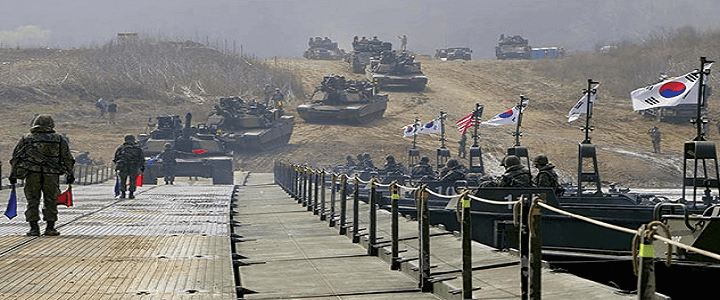Quietly and out of the spotlight, there have been changes within the senior ranks of the Democratic People’s Republic of Korea’s military. These changes, which have sent some of the DPRK’s most-senior general officers into retirement, would seem to confirm suspicions that Chairman Kim Jong-un is consolidating his power base and shedding generals who oppose Kim’s peace overtures to the South and the United States.
Two weeks ago, I pointed out that none of the “hardline” comments coming from Pyongyang were issued in Kim’s name; they all came from vice-minister-level officials. I theorized that the older generation of military leaders, who had grown fat and happy in their positions of power, felt threatened by the prospect of a permanent peace with the South.
Out with the old…
I specifically mentioned the defense minister Gen. Pak Yong-sik. The 68-year-old Pak was born in 1950, the year the Korean War began. He built his entire career (and likely considerable personal fortune) on the perpetual threat of war with the enemies of “Juche.” But it looks as if Pak has been put out to pasture.
South Korea’s Yonhap News Agency’s Sunday night report has garnered little attention in the American mainstream press, but the news is significant. Kim has replaced the three top officials in the DPRK military hierarchy.
No Kwang-chol, who had been serving as Pak’s first vice minister, has replaced his former boss as minister of the People’s Armed Forces.
General Ri Myong-su, a former aide to the late Kim Jong-il, was serving as chief of staff for the People’s Army. He has been replaced by his deputy, Ri Yong-gil. Whereas Pak was born at the onset of the Korean War, Ri began his military career in it. According to the North Korean Leadership Watch, a web site affiliated with 38 North, a project that recently moved from Johns Hopkins University to the Stimson Center think tank, Ri has survived several previous purges, including one that led to the December 2013 execution of Jang Song-thaek, the vice chairman of the National Defense Commission and Kim Jong-il’s brother-in-law.
Kim Jong-un brought Ri out of retirement in 2016 to run the general staff. He has now sent him back to retirement. Ri should hope it is left at that.
Finally, Gen. Kim Su-gil became director of the General Political Bureau of the Korean People’s Army, replacing Vice Marshal Kim Jong-gak. He too has had his share of ups and downs in the leadership, but is currently in Kim Jong-un’s good graces.
More to come?
There is no word—yet—on whether Kim Kye-gwan, the senior vice minister of foreign affairs who assailed the U.S. national security adviser, Amb. John Bolton, or Choe Son-hui, another vice minister of foreign affairs, who called Vice President Mike Pence “a political dummy” for his support of the “Libya Model.”
But if these sudden changes in the military power structure are any indication (and I think there are), more changes are coming. Kim Kye-gwan and Choe Son-hui might want to spend a little more time looking over their shoulders.
In February, I was skeptical of North Korea’s intentions. I’m still skeptical. But with each passing day, the idea that Kim Jong-un is genuinely pursuing a different path that his father, grandfather, and all their sycophants, becomes more believable.
We’re still a long way away from genuine long-term peace on the Korean Peninsula. There are a thousand things that could go wrong between now and the June 12 summit it Singapore. There are an additional thousand and one things that could go wrong after it.
But the recent domestic developments inside the Hermit Kingdom would seem to validate the assessment that Kim is clamping-down on dissent within his immediate subordinate leadership. Optimism may well be justified.




